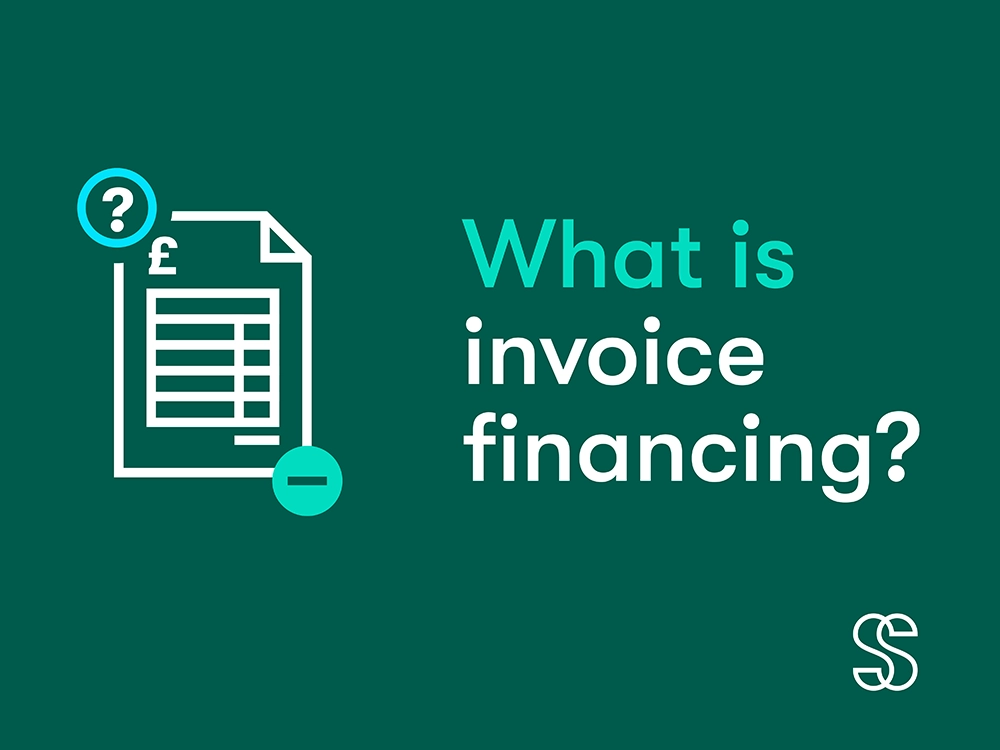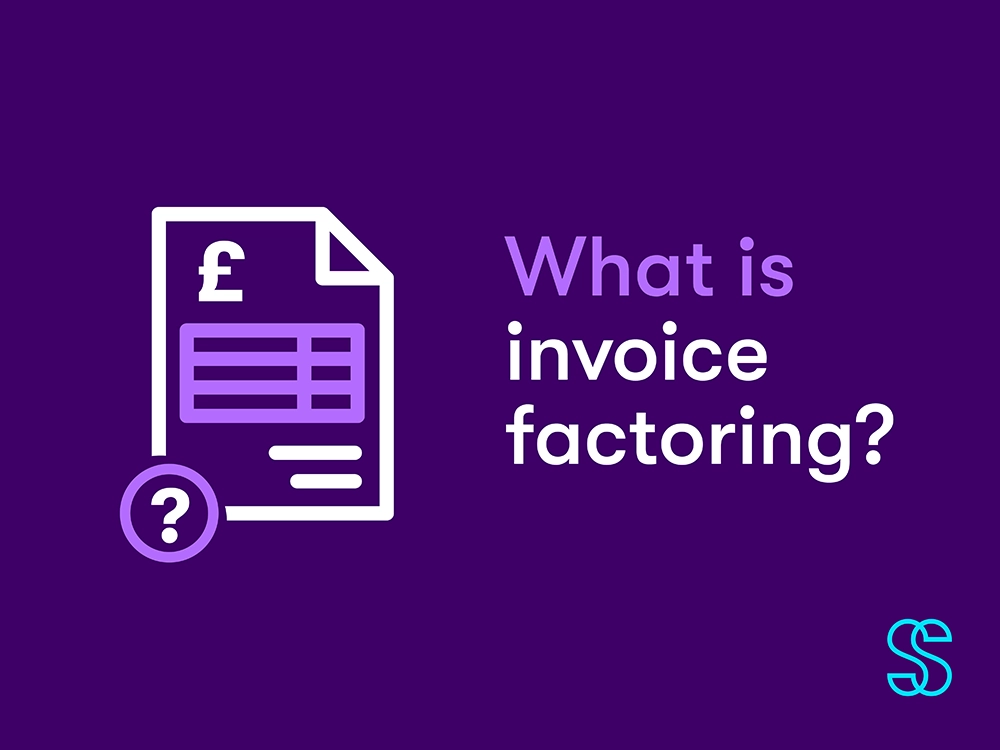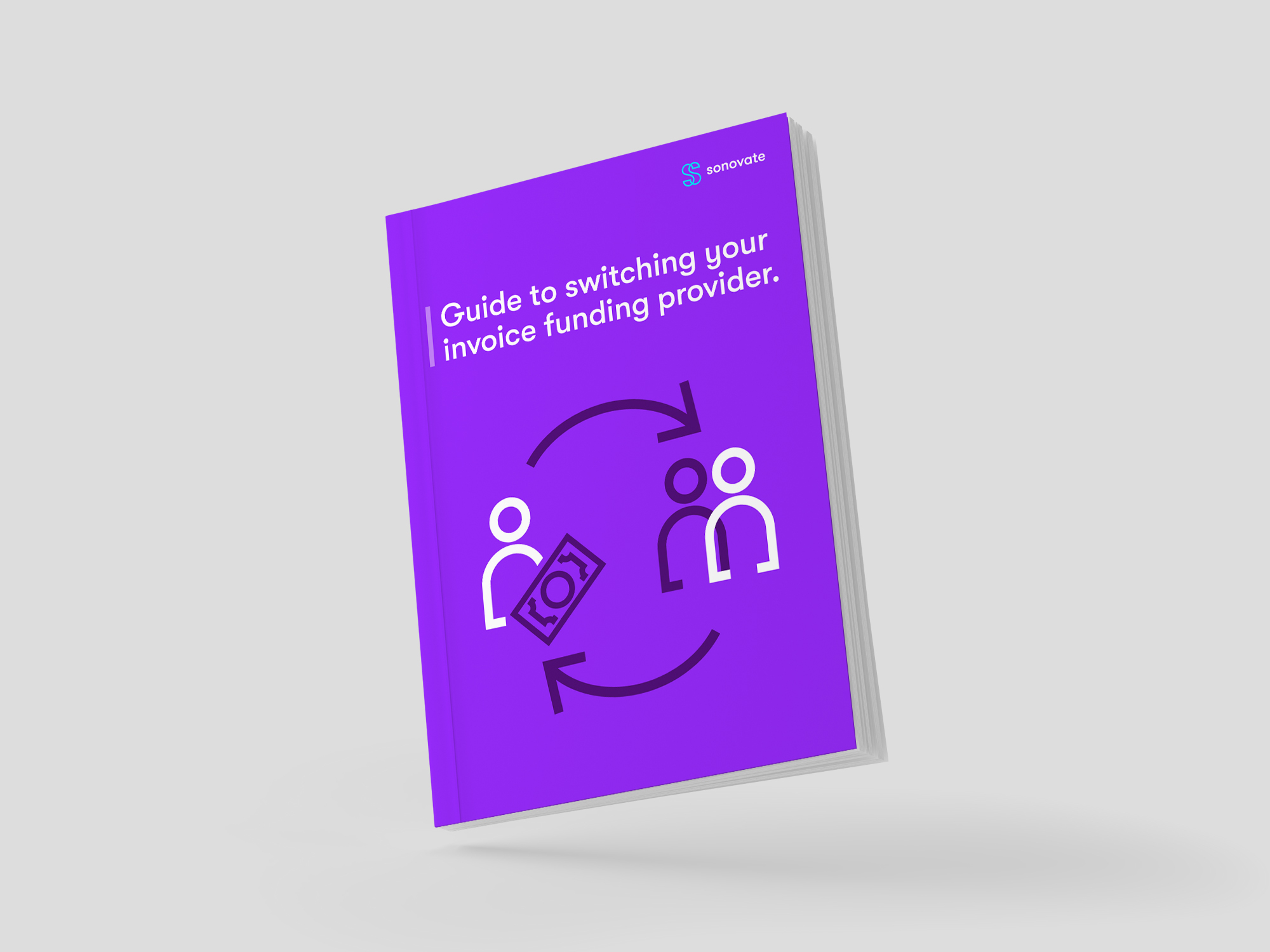Your Guide To B2B Finance
In the last few decades, fintech services have provided business-to-business (B2B) financing solutions that have revolutionised the way companies manage their cash flow, becoming an integral part of modern financial ecosystems.
This guide breaks down what you need to know, including what B2B financing is, what services are involved and which methods are best-suited to effectively support your organisation.
Table of contents:
Introduction What Is B2B Financing? Benefits of B2B Financing Types of B2B Financing Industries that Rely on B2B Finance Can B2B Financing Help Small Businesses? The Bottom Line Sonovate: Your All-Encompassing Finance SolutionWhat Is B2B Financing?
B2B financing refers to the funding services available to companies that primarily engage in commerce with other businesses. This covers a vast range of finance solutions, including traditional methods like bank loans and credit tools provided by alternative lenders, such as invoice discounting and debt factoring.
Approximately 20 years ago, traditional bank loans used to be the only funding option available for businesses that required access to cash. Then, in 2005, the rise of peer-to-peer (P2P) lending began, providing organisations with an alternative service that delivered faster and was significantly less strenuous to acquire.
Since the early 2000s, there have been numerous economic crises that have contributed to increasing demand for financing services in both B2B and B2C markets. These non-bank lenders have and continue to enable companies to obtain working capital with reduced risk and higher convenience.
P2P financial services have been especially beneficial for B2B companies that rely on net terms to make their profits.
Net Terms
Net terms, otherwise referred to as credit terms or trade credit, is a payment approach B2B businesses use to provide a grace period for clients to pay for goods and services. These terms typically agree to delayed payments of 30, 60 or 90 days. These are also known as net-30, net-60 or net-90, depending on the individual agreement. In B2B transactions, these flexible payment offerings are expected in some industries, such as recruitment and healthcare.
However, relying on customer invoices for income can cause serious cash flow problems for many B2B organisations. Time-based permanent terms create gaps in receiving full payments, and if customers miss their invoice deadlines, it further holds companies back from paying necessary expenses and seizing growth opportunities.
While late payments drive financial issues for companies of any size, small-to-medium-sized businesses (SMBs) are particularly impacted. According to recent Tally Street statistics, over half of SMB invoices are collected late, standing at 57%. Their data also shows that 40% are up to 30 days late, and 17% are over a month overdue.
That’s why companies have an increasing dependence on B2B finance solutions to fill the payment gap, generate a steady cash flow and obtain the best outcomes for their business.
Benefits of B2B Financing
Each of these B2B financial solutions has its own unique processes and attributes. To summarise the many benefits these financing options have to offer, we’ve broken them down into three key points.
- Access to Cash: Alternative lenders, regulated by the financial conduct authority (FCA), offer higher approval rates than traditional banks due to their less restrictive credit requirements. This makes B2B financing much more accessible to businesses that may not have a flawless track record.
- Upfront Capital: B2B finance providers have different processes in place for funding confirmation when compared to banks, which significantly reduces the waiting period for borrowing companies. Lenders typically turnover cash within 24 hours, as opposed to four to eight weeks.
- Nurtured Growth: These financing solutions foster success by offering swift service delivery, enhancing flexibility and enabling organisations to make valuable, long-term investments that support sales growth and customer acquisition.
Types of B2B Financing
From traditional methods to alternative services, we’ve listed several main forms of available financing that B2B companies can utilise:
1. Traditional Business Loans
Bank loans often entail long, drawn-out processes that make it difficult to qualify for funding. Organisations must provide documentation regarding their creditworthiness, company age, annual turnover and more to successfully acquire a business loan — which can take months to receive.
With banking loans come hefty interest rates, which can be risky if profits aren’t achieved in a short period of time. Also, due to fixed payment terms and strict conditions, banks don’t offer much flexibility, limiting the borrower’s ability to adjust the loan agreement upon changing circumstances.
2. Debt Factoring
Also referred to as invoice factoring and receivables factoring, debt factoring involves selling outstanding invoices to access cash and secure a steady cash flow. In this process, the factoring provider pays a large percentage of the invoice value (around 70-80%), assumes ownership of the invoice and pays back the full invoice amount — minus applicable services fees — upon customers finalising their B2B transaction.
To qualify for invoice factoring, companies only need to show the creditworthiness of their business customers — and since the invoices are sold to the debt factoring company, it becomes the finance facility’s responsibility to chase customers and collect payments. But this can come with some risk.
Because the finance provider assumes control of customer collections, it means that the customers will be aware that the borrowing company is using a third-party service. Customers may interpret this as a sign of fragility and form negative opinions of the organisation they originally associated with.
However, factoring services also have the potential to speed up the document management process by providing software that sends automatic notifications and offers a comprehensive overview of all transactions on a single accessible platform. In addition, factoring services can be especially useful for larger companies that aim to free up time and resources for their accounts team, allowing them to focus on more pressing business matters.
3. Invoice Discounting
Invoice discounting, also known as invoice financing and accounts receivable financing, is the process in which a company borrows a significant portion of its total outstanding invoice value from a third-party finance facility. These borrowings function as short-term business loans with invoices as collateral.
A primary advantage of invoice discounting is that it offers a straightforward way to quickly boost cash flow without the potential risk of falling into debt. Two added bonuses for companies that use invoice financing are that they remain in control of their sales ledger and that clients remain unaware of this third-party funding arrangement. This confidentiality means that businesses won’t risk their reputation as a result of using these services.
Invoice discounting is an excellent financing solution for small-to-medium sized businesses (SMEs) looking to robustly establish themselves in their industry.
4. Venture Debt
Venture debt provides a useful alternative to equity investments (the ownership of shares or stocks in a company) for beginner businesses. Lenders will use the borrowing company’s latest venture capital equity rounds as a measure to determine the sizing terms.
This debt financing service is supplied to businesses — typically newly established organisations and startups with fast-paced growth — that require funds to foster development. In fact, large corporations like Airbnb used this funding solution to make relevant investments and nurture success.
5. Line of Credit
A line of credit is when a company, typically a small business or SMB, utilises a flexible form of borrowing in which organisations gain a predetermined amount of money from a third-party provider. This process can sometimes be referred to as revolving credit facilities.
Although similar to invoice financing, a line of credit isn’t tied to specific invoices. Instead, it’s a general credit facility that businesses can use for a variety of financial needs. Business owners get to choose the amount of credit they’d like to borrow at a predetermined interest rate, similar to how credit cards work. This capital is only available when it’s needed, as opposed to an upfront payment.
The main benefit associated with a line of credit solution is its flexibility, which makes it especially suited to businesses that aren’t certain of the amount of money they need to pay off expenses and make investments.
6. Mezzanine Financing
Mezzanine financing is a hybrid solution that combines debt and equity financing. Provided by alternative lenders, this funding type ranks lower in priority for repayment when compared to other forms of debt the lender may have extended to the borrower. This means that, in the event of bankruptcy, other financial obligations like senior debt would receive repayment first.
Industries that Rely on B2B Finance
B2B financing provides overwhelmingly helpful benefits for specific industries that are likely to experience cash flow problems on a regular basis. Here are some of the main business types that depend on B2B finance for a steady income:
- Recruitment: Recruitment agencies regularly face challenges with cash flow due to considerable time-based pressures. When awaiting payment from customers, there are other financial responsibilities that businesses must uphold, including punctual payroll for employees and operational expenses. B2B financing solutions, like invoice factoring or payroll financing, help recruitment firms effectively manage their cash flow. By selling their unpaid invoices or borrowing money from a finance company, staffing agencies can gain immediate funds that ensure smooth operations and positive employee experiences regarding compensation. This access to cash allows recruitment companies to take on more clients and seize growth opportunities that previously weren’t a possibility.
- Consultancies: Since consultancies typically receive large client payments after providing their services, these businesses benefit from B2B finance solutions to eliminate cash flow inconsistency. This access to working capital helps to balance out seasonal demands and facilitate growth.
- Manufacturing: Manufacturing businesses often require upfront capital to pay for critical resources, such as raw materials, equipment, and production costs. A B2B financing option such as asset-based lending can help manufacturers acquire the necessary machinery without digging into debt that’s difficult to recover from.
Can B2B Financing Help Small Businesses?
B2B financing is an essential tool utilised by many small businesses. Often, companies will use B2B finance solutions to either sell their entire sales ledger to a factoring company or take out an invoice financing “loan” to gain quick access to working capital.
While organisations may borrow cash from finance providers, there isn’t any debt attached. In addition, invoice factoring means companies sell their assets to another firm for mutual gain, so both the client and the lender benefit from this service — unlike traditional forms of finance such as business loans.
These B2B lending alternatives are accessible to all organisations, irrespective of their credit history. This provides accessible funding solutions for enterprises that don’t have an immaculate credit score. Because it’s an exchange between two corporations, as opposed to a traditional business loan, a perfect record isn’t necessary. Instead, it’s the customer’s credit that matters, playing a primary role in determining whether the invoices get approved. That’s why invoice finance is an ideal option for small businesses that require easy access to cash.
The Bottom Line
Traditional forms of financing, like bank loans, are more likely to rely on older technology, leading to slower decision-making and processing, as well as a more cautious approach to risk consideration. On the other hand, alternative providers will have modern technological processes, so your financial needs are met quickly. They also address the issues with traditional funding such as long waits for payment and high qualification requirements.
Sign up for a demo to get an introduction to our platform today!
Sign up nowSonovate: Your All-Encompassing Finance Solution
It’s important to conduct thorough research to determine the right alternative lender as your funding partner. The best practice is to find a company that’s established, trustworthy and upfront about their service costs.
Sonovate is a financing facility that adjusts its solutions to meet your business needs. Thousands of organisations across the UK trust Sonovate because we understand the value of transparency when finances are on the table. Our support teams go out of their way to ensure you’re getting the best service possible by providing valuable financial advice and extensive availability to support you when you need it most.
We offer a comprehensive platform that simplifies and streamlines your invoice management. And unlike other alternative lenders, we’ll offer you up to 100% of your invoice value, so you can reap the full benefits of our services. With Sonovate, you’ll get:
- A simple setup process.
- An easy way to switch funders if you are already working with a financier.
- Transparent pricing.
- 95% bad debt protection included as standard.
- No hidden fees or charges.
- Zero credit limits.
- No ties into long-term contracts.
Grow your business the smart way with Sonovate.








